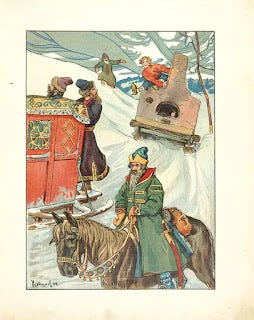[A 1913 illustration from Russian folk tale ‘At the Pike’s Behest,’ also known as ‘Emelyan the Fool.’ В. Курдюмов]
One thing about the current war that has surprised much of the world is how well the smaller and outgunned Ukrainian army has fared against the massive and well-armed Russian force since the latter invaded in February.
But two scholars who were not quite so surprised both happen to be experts on the psychology of children’s literature and how such stories influence our behavior as adults, especially in times of crisis.
Social scientists Sophia Moskalenko and Mia Bloom published an article called “How fairy tales shape fighting spirit” in an academic journal called The Conversation that compares the differences in Ukrainian and Russian folklore as reflected in their respective children’s fairy tales.
Their conclusions are provocative:
The master narratives that Ukrainian children grow up with – which serve as the dominant cultural script – are radically different from the ones Russian children absorb.
Traditional Ukrainian bedtime stories, such as “Kotygoroshko,” “Kyrylo Kozhumyaka” and “Ivasyk Telesyk,” all portray unassuming characters persevering against insurmountable odds.
In Ukrainian children’s bedtime stories, the main characters often start out as unlikely heroes, but their courage, cleverness and grit help them succeed against the odds.
In contrast, Russian children’s stories often revolve around a central character named Ivan Durak – Ivan the Stupid.
In Russian fairy tales such as “By the Pike’s Wish,” “Princess Frog” and “Sivka Burka,” the main character eventually prevails. He doesn’t win through his own virtues, though, but through the intervention of a magical being – a fish, a frog, a horse – that does all the hard work while the main character claims credit.
These Russian folk tales seem to suggest that the recipe for success is not to be too smart or work too hard, but to sit tight in hope that magic will take care of everything.
Nobody would suggest that the entire explanation for the Ukrainians’ surprising success against the Russians will boil down to which fairy tales they learned as children, of course, and the authors of this article are suitably modest in their claims.
But they may be on to something extremely significant here.
[Thanks to my friend Laurie Sigillito, founder and CEO of Local News Network, for alerting me to the fairy tales article.]
LINKS:
Why a unanimous jury will never convict Trump, even if he’s guilty as sin (SFC)
Trump’s Hush Money: A History of the WSJ’s Investigation (WSJ)
House GOP uses its new power in extraordinary effort to shield Trump from indictment (CNN)
What Trump's 'arrest' claim says about his hold on politics and the 2024 election (NPR)
Stop Overthinking It: An Indictment Would Be Bad For Trump (Politico Mag)
Mugshot, fingerprints, handcuffs? What is the process for indicting Donald Trump on criminal charges (Independent)
Law enforcement prepare for possible indictment of Trump (CBS)
Despite Trump’s call for protests in anticipation that he'll be arrested for hush money payments to adult actor Stormy Daniels, members of the media vastly outnumbered his supporters at the rally outside the Manhattan district attorney’s office. Other major U.S. cities are beefing up security to prepare for unrest.[HuffPost]
A federal judge rejected a request by Trump to keep key evidence out of his civil rape trial next month. The judge ruled that key witnesses will be allowed to testify and misogynistic remarks Trump made in 2005, when he apparently didn’t realize he was being recorded, can be played for a jury that will hear the case brought by former magazine columnist E. Jean Carroll. [AP]
Credit Suisse Sets a Frightening Precedent for $250 Billion in Bonds (Barron’s)
World on ‘thin ice’ as UN climate report gives stark warning (AP)
The AI Revolution Could Be Bigger and Weirder Than We Can Imagine (Ringer)
Why All the ChatGPT Predictions Are Bogus (Atlantic)
Google’s catch-up game on AI continues with Bard launch (WP)
Bing’s AI chatbot can now generate unhinged images along with unhinged text (Ars Technica)
Bing A.I. and the Dawn of the Post-Search Internet (New Yorker)
Nearly Half of Firms Are Drafting Policies on ChatGPT Use (Bloomberg)
Four ways ChatGPT could help level the humanitarian playing field (New Humanitarian)
Perhaps The Most Disruptive Technology In History Is Coming And It’s Expected To Change Everything. Businesses And Marketers Need To Get Quantum Ready. (Forbes)
Iowa’s sharp right turn: From centrist state to ‘Florida of the North’ (WP)
We’ve Got What It Takes to End Poverty in America (Mother Jones)
Xi’s trip to Russia boosts 'dear friend' Putin as China pushes back against U.S. power (NBC)
Afghanistan's school year starts with calls for all girls to be allowed back (Reuters)
Top Afghan Taliban leader issues decree against nepotism (AP)
Macron’s Government Survives but Faces Wrath of France Over Pension Overhaul(NYT)
Biden signs legislation to declassify certain intelligence on Covid pandemic origins (CNBC)
Los Angeles schools shut down as staff begin 3-day strike (AP)
Parents Formally Announce Transfer Of Expectations To Second Child (The Onion)

No comments:
Post a Comment